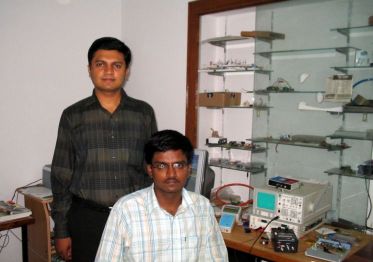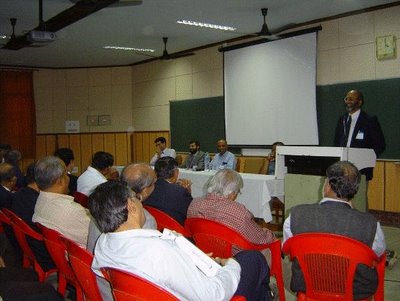You will have to wear different hats – Founder, shareholder and Employee as a CEO – on different days.
Meet Your Buddy, Vol 7: Satya Prabhakar


Tell us something about the idea and history of Sulekha.
Sulekha started as a hobby in 1998 while I was working with AT&T. The idea was being discussed in a mailing list of IIM Calcutta – Dakghar – and that is where it struck me. I took a break from work when the traffic was exploding in 1999-2000.
How difficult was it to get funding for a web based company at the height of dotcom bust?
We tried raising money but were not successful even after meeting about 50 VCs. But we had user interest to portray. And we knew that no good idea ever died due to lack of funding. Finally IMG (Indigo Monsoon Group) invested in 2001.
Soon, we had acquisition offers from Rediff and Sify. But we were confident of our company and this has paid off. Today we are the #1 Indian community outside India and already #5 in India – just behind Rediff, Sify, MSN and Yahoo.
What were the other challenges you faced in initial days?
Initially it was difficult to hire and retain good people. However, we soon realized that once we hire good people for HR and Finance, it is not difficult to scale up and even retain people.
Where does Sulekha stand now and what is the future?
I am proud to say that Sulekha has now become by far the biggest and most popular member generated community and social-professional networking hub integrating social media and local commerce services for Indians worldwide. More than 95% of Sulekha's 10 Million+ pages of content are member generated. We also have 1.5 M members providing 30 M monthly page views!
At this stage of growth, we are focusing heavily on India now. India, obviously, adds more Indians than entire Indian worldwide. So, this becomes the obvious choice.
Where do you see the sudden explosion of SNS (Social Networking Sites) going?
I believe SNS for the sake of networking is not an enduring phenomenon. Every one of us is becoming cash rich and time poor. So, your social network must deliver a meaningful value. In future, transaction will become largely local. Hence our motto is to deliver meaningful content with integration of social media and networking with local commerce.
We realize that a youngster in 15-25 age group, which are the prime targets for most SNS, have no money to spend, so Sulekha uniquely focuses on older audience.
Tell us something that you learned from your entrepreneurial journey.
Entrepreneurship involves challenges at each step. But you learn to conquer all obstacles with confidence. You will have to wear different hats – Founder, shareholder and Employee as a CEO – on different days.
It is all about creating IP with passion. Whatever you earn is proportional to the IP you create. So, one needs to be ready to learn new tech and create something of value very, very quickly.
The 4 I’s of success are – Intelligence, Industry, Initiative and Integrity. So the focus of today’s youth should be to focus on learning. The objective should be to learn at every step quickly. Jobs are never meant to make life comfortable. The idea is to operate in the zone of discomfort and to push ourselves to achieve greater heights every single day.
How does it feel to be able to bring Sulekha here?
Frankly, there is no special feeling, no great sense of accomplishment as even with our size we are still very small and there is lot still left to learn. Every day you get great opportunities. But I can certainly say if I get a chance again I will be definitely be doing it again.
How does an MBA help in entrepreneurship?
A business requires you to be good at everything – product innovation, finance, HR and marketing. A general management degree gives you an exposure to all of these aspects.
MBA gives you an infrastructure to develop a better product and get it over to market. What is important is to know all the right questions to ask than to know the right answers of all questions.
However, MBA education in India, generally, is not very good primarily due to lack of right faculty with real-life corporate experience.
What do you still remember about REC Trichy?
REC Trichy (then) enjoyed a very good reputation in India with a stronger academic orientation with no history of a strike ever. So, it was my obvious choice over other options i had. At Trichy, it was a cosmopolitan culture which prepares you to face professional world with more confidence and adaptability to excel anywhere and everywhere irrespective of linguistic or geographic constraints. I learnt to read and write Tamil there. I very vividly remember hostel level interactions even though I was not one of the guys in the coterie of the happening “cool” junta.
What should NIT Trichy do to promote its brand?
One very important thing is to have a faculty that inspires interest in their subject. We should organize bigger alumni events and publicize them well. The alumni days can be converted into global alumni meets. There is also a need to build an updated searchable alumni database.
What is your feedback about Meet Your Buddy series?
It would be great if you can make a human sketch of a person like creating an executive profile of the person you are portraying. [We are happy to say that we instantly accepted this suggestion from this volume onwards. Thank you, Satya!]
[Feel free to email us if you know an illustrious REC/NIT Trichy alumnus. We would like to have your comments on the new format.]
Team MYB.
Arpit Agarwal
Anurag Saxena
Prashant Sree - prashantsree21@gmail.com
Labels: meetyourbuddy, rec trichy, RECAL, Recal Bangalore






 Mr. Muthukamaran (standing on dais), in a panel discussion at XLRI, Jamshedpur
Mr. Muthukamaran (standing on dais), in a panel discussion at XLRI, Jamshedpur
